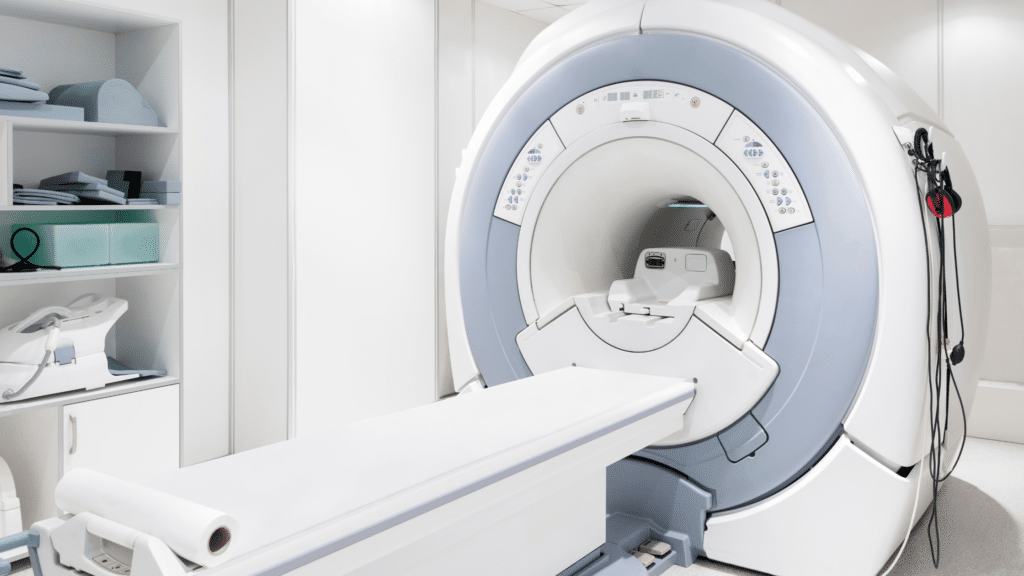MRI, or Magnetic Resonance Imaging, is a medical imaging technique that uses a strong magnetic field and radio waves to generate detailed images of the body’s internal structures. It is a non-invasive and painless procedure that has revolutionized the field of medical diagnostics. If you have been scheduled for an MRI, you may have some questions and concerns. In this article, we will address the most frequently asked questions about getting an MRI, providing you with the information you need to feel informed and prepared for your scan.
Frequently Asked Questions Abour MRIs
1. How does the MRI scanner work?
The MRI scanner utilizes the natural properties of hydrogen atoms in the body to generate images. When you are placed within the magnetic field, the hydrogen atoms align and spin in the same direction as the magnetic field. When a radio frequency wave is transmitted through the tissues, the aligned hydrogen atoms emit a signal. These signals are then measured and processed to produce detailed images of the internal structures of the body.
2. Why is MRI important?
MRI is an essential tool in modern medicine because it provides detailed and accurate images of the body’s soft tissues, such as the brain, spine, joints, and internal organs. It allows healthcare professionals to differentiate between healthy and diseased tissues, aiding in the early detection and treatment of various conditions. Furthermore, MRI scans have no known side effects, making them a safe and reliable diagnostic tool.
3. What causes the noise in the scanner?
The noise generated by the MRI scanner is primarily caused by the electrical current running through the wires of the gradient magnet. This current opposes the main magnet field, and the strength of the field determines the loudness of the gradient noise.
4. Will it hurt?
No, undergoing an MRI scan is a painless procedure. You will not feel anything during the scan. However, it is common for patients to be given a call button before the exam begins. This button allows you to communicate with the technologist if you have any concerns or discomfort during the scan.
5. What is the difference between MRI and CT?
Both MRI and CT (Computed Tomography) scans are imaging techniques that create cross-sectional images of the body. However, there are some key differences between the two. MRI uses a strong magnetic field and radio waves, while CT utilizes ionizing radiation. MRI is particularly useful for imaging soft tissues and providing excellent contrast, while CT is often preferred for imaging bone and providing detailed images of the chest and abdomen.
6. Can you scan my entire body while I am in there?
No, the MRI scanner can only scan a specific area of the body at a time. Each scan is limited to a particular region, and it may take anywhere from 30 to 60 minutes to complete the scan for that specific area. If multiple areas need to be scanned, separate scans will be performed for each region.
7. Why is my whole body in the scanner if you are only scanning my head?
The area of the scanner that creates the images, known as the isocenter, is located in the center of the magnet. When imaging the head, for example, most of the upper body will also be inside the scanner to ensure proper alignment and capture of the necessary images. The same principle applies when imaging the spine and upper extremities.
8. Does the MRI table have a weight and size limit?
Yes, the MRI table has weight and size limitations. The weight limit is typically around 250kg, and the table’s maximum width is usually 70cm. It is crucial for the area being examined to be within the magnet’s isocenter, which is located in the center of the scanner. If you have any concerns regarding your specific case, it is best to contact the MRI bookings department for more information.
9. How long does an MRI exam take?
The duration of an MRI exam can vary depending on the specific body part or area being scanned and the complexity of the examination. On average, brain and spine exams may take about 45 minutes, and if contrast is involved, the study may take slightly longer. Body exams can range from 45 to 60 minutes, while cardiac MRI, due to the physiological function of the heart and natural breathing motion, may take up to two hours. Other areas, such as the knee, ankle, hip, elbow, and wrist, may take 25 to 45 minutes, depending on the length of the anatomy of interest. Breast imaging exams typically take about 45 minutes to an hour, and if a breast biopsy is required, the exam may take up to one hour. It is important to note that these time estimates are general guidelines, and the actual duration of your MRI exam will be determined by your specific case and the instructions provided by your healthcare provider.
10. Other considerations before your MRI
Before your MRI exam, there are a few important factors to keep in mind. It is essential to follow any pre-scan instructions your healthcare provider provides, such as fasting or avoiding specific medications. It is also important to inform your healthcare provider if you have any metal implants, devices, or foreign bodies in your body, as they may interfere with the MRI scan. Lastly, if you experience any claustrophobia or anxiety related to the MRI procedure, let your healthcare provider know in advance, as they may be able to provide strategies or options to help you feel more comfortable during the scan.
In conclusion, MRI is a valuable medical imaging technique that allows for the detailed visualization of the body’s internal structures. Understanding how an MRI scanner works, the importance of MRI in healthcare, and what to expect during the scan can help alleviate any concerns or anxieties you may have. Remember to follow any pre-scan instructions and communicate with your healthcare provider about any specific needs or concerns you may have. With this knowledge, you can confidently and confidently approach your MRI scan.

